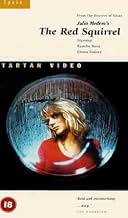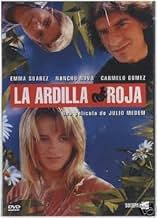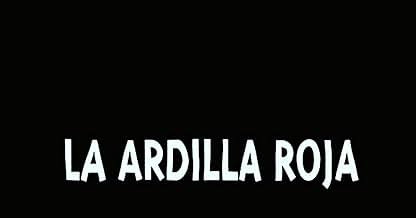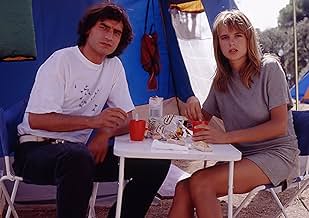A suicidal, has-been rock star tells an amnesiac woman they are longtime lovers after he witnesses her crash her motorcycle.A suicidal, has-been rock star tells an amnesiac woman they are longtime lovers after he witnesses her crash her motorcycle.A suicidal, has-been rock star tells an amnesiac woman they are longtime lovers after he witnesses her crash her motorcycle.
- Awards
- 12 wins & 5 nominations total
Susana García Díez
- Eli
- (as Susana García)
- Director
- Writer
- All cast & crew
- Production, box office & more at IMDbPro
Featured reviews
The Spanish version of Vertigo, this story is more than meets the eye. The plot if very much one sided. Although you do great a nice switch at the end of the movie, the journey getting there is better. A sweet ending with not much to it, the audience is given a happy ending like in much fiction. Emma Suarez is amazing. She steals every scene with her seduction. From the start of the movie, it appears that Emma plays the victim. As the story unfolds, she becomes the aggressor in more ways than one.
'The Red Squirrel' starts off like a Hitchcockian thriller, but soon becomes more complex and difficult to categorize. By the end of this utterly fascinating movie I would be hard pressed to label it. "A mystery" and "a love story" don't give you the whole picture. Just see it for yourself if you want something challenging and original. I know nothing about writer/director Julio Medem, but after watching this film I will rectify that as soon as possible! The basic plot is fairly simple - a washed up pop star contemplates suicide. Before he can do so he witnesses a road accident, a motorbike crash. A young girl is injured slightly but appears to be amnesiac. On the spur of the moment he tells her that he is her boyfriend and invents a name for her (Lisa, his ex-girlfriend, who he still loves). He visits her as she recuperates in hospital, and as it looks more and more likely that he will be found out, he smuggles her out and takes her on a camping holiday. Then things get a bit strange... The plot as I said is fairly simple, but the movie is not. I was hooked from the opening scenes and was fascinated until the very end. I really enjoyed this movie and highly recommend it.
Julio Medem's 'La Ardilla Roja' follows the same path of surrealism as his previous film 'Vacas'. Intricately layered and open to interpretation, Medem's films are a class of their own. Of course he is influenced by many great filmmakers like Hitchcock, Buñuel and the Coen Brothers, to name a few, and artists like Salvador Dalì and he is not ashamed to show it in his unique films. The story starts off simple enough and then it progresses into something more complicated entangling itself in a psychological drama, a mystery thriller, dark comedy, erotica and surrealism. While the likes of Almodovar have gained recognition in the world cinema circuit, I wonder why Julio Medem still remains less known.
Made with a modest budget, 'La Ardilla Roja' is skillfully executed. The cinematography, lighting and visuals create a very recognizable world and yet the way it's presented contributes to the element of surrealism. The score is used efficiently and the acting is superb, especially that of Emma Suárez, Nancho Novo and María Barranco.
His proceeding releases only prove that Julio Medem is getting better and better with each film. 'La Ardilla Roja' is not one to be missed
Made with a modest budget, 'La Ardilla Roja' is skillfully executed. The cinematography, lighting and visuals create a very recognizable world and yet the way it's presented contributes to the element of surrealism. The score is used efficiently and the acting is superb, especially that of Emma Suárez, Nancho Novo and María Barranco.
His proceeding releases only prove that Julio Medem is getting better and better with each film. 'La Ardilla Roja' is not one to be missed
While struggling to have courage to jump off from a bridge to commit suicide, the musician Jota (Nancho Novo) that misses his girlfriend witnesses an accident with a motorcycle, with the rider falling down on the beach. Jota helps the unknown woman that has amnesia and goes in the ambulance with her to the hospital. Jota invents her name, calling her Lisa (Emma Suárez), and also that they have been living together for four years in his apartment nearby the beach. On the next morning, Jota visits Lisa, who is in session with the psychologist; then he leaves the hospital with her telling that she was discharged. Jota reinvents Lisa's past and travels with her to the camping "La Ardilla Roja", where they befriend the family of a taxi driver. When a stranger comes to the camping claiming that Lisa's name is Sophia indeed and that he is her husband, Jota feels trapped in his lies and questions whether Sophia has had amnesia.
"La Ardilla Roja" is a weird and entertaining love story, with an original and surrealistic screenplay and bizarre characters and situations. The gorgeous Emma Suárez has a stunning performance and shows a great chemistry with the odd and unusual Jota, performed by Nancho Novo. The climax with the arrival of Felix to the camp site is strange and a little disappointing, but the happy end fits well to the plot. My vote is seven.
Title (Brazil): "O Esquilo Vermelho" ("The Red Squirrel")
"La Ardilla Roja" is a weird and entertaining love story, with an original and surrealistic screenplay and bizarre characters and situations. The gorgeous Emma Suárez has a stunning performance and shows a great chemistry with the odd and unusual Jota, performed by Nancho Novo. The climax with the arrival of Felix to the camp site is strange and a little disappointing, but the happy end fits well to the plot. My vote is seven.
Title (Brazil): "O Esquilo Vermelho" ("The Red Squirrel")
Julio Medem is something of an underrated figure within the spectrum of world cinema. He regularly produces bold, imaginative and exciting films that shatter the usual preconceptions we might have of the limitations of cinematic language and storytelling in the visual sense, as well as presenting an incredibly intelligent and original approach to the ideas of production design, editing and cinematography. Despite this, however, he has yet to be fully acclaimed universally as a great filmmaker in the tradition of Tarkovsky, Bergman, Hitchcock, Kubrick, Godard, Welles etc - or even ranked alongside contemporary cinematic figures such as Pedro Almodóvar, Lars von Trier, Aki Kaurismäki, Michael Haneke and Guillermo Del Toro. The Red Squirrel (1993) was only Medem's second feature following the elliptical historical satire Vacas (1991) and yet, even now we can already see the themes from that particular film being further developed in preparation for the later, perhaps even great films, such as Tierra (1996), The Lovers of the Arctic Circle (1998) and Sex and Lucia (2001).
Like those films, The Red Squirrel is a multi-layered work rife with possible interpretations and elements of broad, Buñuelian surrealism that are at odds with the more recognisable presentation of reality established in the film's intriguing first half. On our initial viewing the plot can seem incredibly straightforward, revolving around the strange relationship between a suicidal former pop star and the mysterious, amnesiac woman who literally falls into his life. With this section of the film, Medem creates a truly unique modern-day thriller, building on elements of Hitchcock - most noticeably Vertigo (1957), with its iconographical depictions of mysterious blondes, shadowy villains, damaged heroes and seething paranoia - but intelligently subverting them by way of elements as diverse as Salvador Dali, the aforementioned Buñuel, low-budget B-movies, The Road Warrior (1980), elements of magical realism and ideas central to the Basque regional identity; again, drawing parallels with the hypnotic and self-reflexive world of Vacas. These subtle editions compliment the more recognisable characteristics of the romantic-thriller mystery story at the heart of the film to create something that is much more engrossing, enticing, and unique.
As the story progresses and we are drawn ever deeper into the film's central mystery, we begin to note the emergence of further plot influences, such as psychological horror, melodramatic eroticism, heart-stopping suspense, black comedy and eventually full-blown surrealism. As it does, the film then becomes much more complex, taking on issues of love, sexuality, mental and physical manipulation, mind-games and cinematic role-playing. Medem ties the whole thing together with some wonderful set pieces and a staggering use of cinematic style put together on an obviously limited budget. It isn't purely the imagination and intelligence of Medem that impresses us though; with every wild narrative U-Turn or directorial flourish - incorporating everything from Kiss Me Deadly (1955) to Raising Arizona (1987) - being backed up by the fine performances from lead actors Nancho Novo and Emma Suárez, both of whom manage to makes us care an enormous amount about these two protagonists and the relationship that forms between them.
Although it's always tempting to say that both Medem and his work is unlike anything else you will ever see; I think there are some obvious reference points here, many of which have been mentioned above, as well as a certain similar approach to filmmakers such Krzysztof Kieslowski - with the deep, meditative and vaguely hypnotic use of camera combined with the intricate presentation of a narrative driven by the purely psychological; most apparent for example in his epic TV series Dekalog (1989) and one of his greatest films, The Double Life of Veronique (1991) - and especially a filmmaker like Wong Kar-Wai, with the idea of the lead character's enigmatic pop song describing the narrative and the central location manipulating the story so as to take on more self-reflexive, metaphorical notions being very much in keeping with films such as like Happy Together (1997), In the Mood for Love (1999) and 2046 (2004).
As with much of Medem's work, including the 2001 erotic mystery thriller Sex and Lucia, the film uses much in the way of cinematic coincidences, with the various coincidences that form the basis of the plot acting as clues to the narrative. This turns the film into a wonderful example of cinematic storytelling, creating a real mystery for the audience in which all the pieces fall perfectly into place during the film's final act, but still leave us room for interpretation. Without question, this is a delightful cinematic experience that goes way beyond the limitations of film; elaborating on some of the complex ideas regarding narrative, time, character and spirit presented in Vacas, whilst simultaneously foreshadowing the ideas of escape, transcendence, imagination, eroticism and the notion of a story being written as it goes, which will all be further developed in Sex and Lucia. With this in mind, The Red Squirrel is an absolute marvel; an epic, ornate jigsaw-puzzle for the audience, and - without question - one of the greatest films of the 1990's.
Like those films, The Red Squirrel is a multi-layered work rife with possible interpretations and elements of broad, Buñuelian surrealism that are at odds with the more recognisable presentation of reality established in the film's intriguing first half. On our initial viewing the plot can seem incredibly straightforward, revolving around the strange relationship between a suicidal former pop star and the mysterious, amnesiac woman who literally falls into his life. With this section of the film, Medem creates a truly unique modern-day thriller, building on elements of Hitchcock - most noticeably Vertigo (1957), with its iconographical depictions of mysterious blondes, shadowy villains, damaged heroes and seething paranoia - but intelligently subverting them by way of elements as diverse as Salvador Dali, the aforementioned Buñuel, low-budget B-movies, The Road Warrior (1980), elements of magical realism and ideas central to the Basque regional identity; again, drawing parallels with the hypnotic and self-reflexive world of Vacas. These subtle editions compliment the more recognisable characteristics of the romantic-thriller mystery story at the heart of the film to create something that is much more engrossing, enticing, and unique.
As the story progresses and we are drawn ever deeper into the film's central mystery, we begin to note the emergence of further plot influences, such as psychological horror, melodramatic eroticism, heart-stopping suspense, black comedy and eventually full-blown surrealism. As it does, the film then becomes much more complex, taking on issues of love, sexuality, mental and physical manipulation, mind-games and cinematic role-playing. Medem ties the whole thing together with some wonderful set pieces and a staggering use of cinematic style put together on an obviously limited budget. It isn't purely the imagination and intelligence of Medem that impresses us though; with every wild narrative U-Turn or directorial flourish - incorporating everything from Kiss Me Deadly (1955) to Raising Arizona (1987) - being backed up by the fine performances from lead actors Nancho Novo and Emma Suárez, both of whom manage to makes us care an enormous amount about these two protagonists and the relationship that forms between them.
Although it's always tempting to say that both Medem and his work is unlike anything else you will ever see; I think there are some obvious reference points here, many of which have been mentioned above, as well as a certain similar approach to filmmakers such Krzysztof Kieslowski - with the deep, meditative and vaguely hypnotic use of camera combined with the intricate presentation of a narrative driven by the purely psychological; most apparent for example in his epic TV series Dekalog (1989) and one of his greatest films, The Double Life of Veronique (1991) - and especially a filmmaker like Wong Kar-Wai, with the idea of the lead character's enigmatic pop song describing the narrative and the central location manipulating the story so as to take on more self-reflexive, metaphorical notions being very much in keeping with films such as like Happy Together (1997), In the Mood for Love (1999) and 2046 (2004).
As with much of Medem's work, including the 2001 erotic mystery thriller Sex and Lucia, the film uses much in the way of cinematic coincidences, with the various coincidences that form the basis of the plot acting as clues to the narrative. This turns the film into a wonderful example of cinematic storytelling, creating a real mystery for the audience in which all the pieces fall perfectly into place during the film's final act, but still leave us room for interpretation. Without question, this is a delightful cinematic experience that goes way beyond the limitations of film; elaborating on some of the complex ideas regarding narrative, time, character and spirit presented in Vacas, whilst simultaneously foreshadowing the ideas of escape, transcendence, imagination, eroticism and the notion of a story being written as it goes, which will all be further developed in Sex and Lucia. With this in mind, The Red Squirrel is an absolute marvel; an epic, ornate jigsaw-puzzle for the audience, and - without question - one of the greatest films of the 1990's.
Did you know
- TriviaStanley Kubrick was such a fan of the film, he purchased Julio Medem's own personal print.
- ConnectionsReferenced in Brows Held High: Room in Rome (2013)
- How long is The Red Squirrel?Powered by Alexa
Details
- Runtime1 hour 54 minutes
- Color
- Sound mix
- Aspect ratio
- 1.85 : 1
Contribute to this page
Suggest an edit or add missing content
































